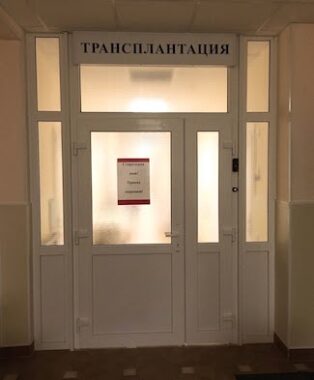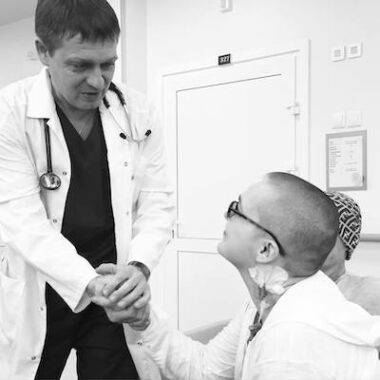Embracing the unknown in Russia taught me a crucial lesson
How my experience in Moscow helped me handle a stem cell transplant
Written by |

Note: This column describes the author’s own experiences with an autologous hematopoietic stem cell transplant (aHSCT). Not everyone will have the same response to treatment. Consult your doctor before starting or stopping a therapy.
In June 2016, I traveled to Moscow with two friends. The first evening we were there, we found ourselves a bit lost. We were looking for an English-friendly restaurant that had been recommended to us, but somehow we got turned around in a mall and seated where no one spoke any English. In that moment, I felt out of place and afraid. We were lost, didn’t speak Russian, and had no idea what would happen next.
Thankfully, my friends had significantly more travel experience, and they embraced the situation as an exciting adventure. Thank God for Google Translate and a waiter with a great sense of humor who didn’t shy away from the communication barrier and enjoyed bringing us different foods to sample. Although daunting at first, this dining experience became a delightful one, and it set the tone for the rest of my Moscow journey.
We traveled to Russia to see Denis Fedorenko, a leading hematologist, so I could undergo an autologous hematopoietic stem cell transplant. This is a procedure where chemotherapy wipes out a patient’s immune system, which is then replaced with transplants of their own stem cells — the goal of which is to halt further multiple sclerosis (MS) disease activity. It’s not approved by the U.S. Food and Drug Administration, but its medications and protocols are.

The transplant ward of Pirogov National Medical and Surgical Center in Moscow. (Courtesy of Ahna Crum)
For nearly 10 years, I was prescribed various disease-modifying therapies (DMTs), to no avail. My disease course was aggressive. Sometime along the way, my neurologist switched my diagnosis from relapsing-remitting multiple sclerosis to aggressive relapsing MS in his dictation.
I failed the medications Copaxone (glatiramer acetate injection), Betaseron (interferon beta-1b), and Gilenya (fingolimod) before advancing to Tysabri (natalizumab). I don’t know that I can successfully relay the fear in the pit of my stomach when I learned I had new active lesions, even on Tysabri. None of the medications stopped my disease activity.
In fact, since the start of my MS journey in 2006, I never had a year without a couple of relapses or an MRI that didn’t showcase a handful of new and active lesions. While there are arguments about whether aHSCT should be a first-line treatment approach to managing MS, for me it was a last-chance Hail Mary pass at getting ahead of my disease.
There are multiple stages of aHSCT. Getting to Russia was a big first step, but I still had to pass a battery of preliminary tests, go through a condition regimen, complete five days of chemotherapy, spend a week in isolation, and grow an entire new immune system before knowing if the transplant would work. The entire process is full of unknowns, but getting lost in that Russian restaurant made all the difference; it taught me the value of embracing the unknown.
My experience of aHSCT
Recovery post-aHSCT is also a roller coaster of ups and downs riddled with the unexpected, and I’ve tried to hold on to the lesson of becoming comfortable outside of the familiar.
I fought through significant complications, including low cortisol levels (secondary adrenal insufficiency) and my bones dying (avascular necrosis). But despite those setbacks, aHSCT changed everything for me. It gave me a new life to build from the ground up.
I have not experienced any disease activity since 2016 and have seen significant improvements and resolution of some MS symptoms, including spasticity, trigeminal neuralgia, muscle weakness, foot drop, heat intolerance, and impaired balance. The respite from active disease has allowed me to start a career as a dietitian.
Active MS or not, my day-to-day status still varies widely, and I don’t know what lies ahead in the next month, year, or chapter of my life. That’s life with any autoimmune disease; there’s always a looming question about what’s next in treatment decisions, finances, physical ability, etc., all of which can incite fear.
This column’s message isn’t to steer everyone toward aHSCT. MS is a complex disease, and I recognize that not everyone responds the same way to one treatment. I’ve learned, and continue to learn daily, that even when I can’t see the next step, it’s empowering to break through fear and take the next step anyway.
What I wish for you is that when you stumble into the unknown, whatever that circumstance might be for you, you look fear in the face, embrace that unknown, and take the next step forward. That step may take you on an exhilarating, life-changing journey just outside of your comfort zone.
Note: Multiple Sclerosis News Today is strictly a news and information website about the disease. It does not provide medical advice, diagnosis, or treatment. This content is not intended to be a substitute for professional medical advice, diagnosis, or treatment. Always seek the advice of your physician or other qualified health provider with any questions you may have regarding a medical condition. Never disregard professional medical advice or delay in seeking it because of something you have read on this website. The opinions expressed in this column are not those of Multiple Sclerosis News Today or its parent company, Bionews, and are intended to spark discussion about issues pertaining to multiple sclerosis.





Roxanne Folk
Please keep us posted on your improvements
Ahna Crum
Will do! Thank you for taking the time to read!
Libbie
A beautiful message, and so wonderful to hear about your great response to treatment.
Ahna Crum
Thank you! I feel very blessed to have stumbled upon HSCT and then to experience the results that I did. I know it's not the same for everyone.
Joseph
Great post. I’ve had a similar response to aHSCT. While I agree with the sentiment that MS is complex and aHSCT is not appropriate for everyone, I think that the message needs to get out there to push against the “go slow” approach to therapy that still pervades MS treatment, despite a mountain of evidence to the contrary.
Ahna Crum
I'm so glad you've also found success with HSCT! And I do think slowly but surely the evidence is starting to shift therapy recommendations. This neurologist gives me hope that this conversation is happening and reframing how many MDs are approaching managing MS - Brandon Beaber, MD: Busting MS treatment misconceptions.
Jackie Kaiko
I was surprised to read that 1) the writer had had this procedure done in Russia and 2) that the writer did not speak Russian. Info from the National MS Society reports that aHSCT is a lengthy process that requires extensive aftercare monitoring and follow up with highly trained specialist teams. It also cautions MS patients that many international stem cell transplant clinics don't have the same sanitation and clinical quality standards as The Foundation for Accreditation of Cellular Therapy would advise. Depleting and then rebuilding the immune system can make patients highly vulnerable to infections.
Ahna Crum
HSCT is still not available in many countries. At the time I chose HSCT, it was not available in the US outside of a clinical trial which I was not accepted into. I was very fortunate to have a quick turnaround transplant date in Russia from the date I applied as time was of the essence. The hospital I went to in Russia has been offering HSCT for MS patients for ~16 years. I can't speak for the other international locations for HSCT, but this hospital is one of the top healthcare facilities I've seen to date. The doctors there speak wonderful English as well so communication overall was not a problem. HSCT is a lengthy procedure and certainly not something to take lightly but it is possible to go through this process successfully internationally - it just requires a bit more prep work ahead of time. Before treatment, it recommended that you set up a care team for follow up appointments throughout your recovery. You leave isolation at the HSCT facility with a functioning immune system albeit your numbers are low. It can take up to 2 years for your immune system to fully regrow - mine took about a year. I was in Russia for a little over ~4 weeks and I had a local primary care physician, neurologist, hematologist, endocrinologist, and physical therapist on my team that provided follow up care and collaborated with Dr. Fedorenko when needed. I was fortunate to not have any complications from infections during my recovery.
Raj
Beautiful story
Ahna Crum
Thank you!
Kevin G Keplinger
It's just so sad that MS patients still are leaving the country to have HSCT. HSCT should've been recognized years ago as a frontline treatment & made available to everyone!!!! www.hsctwarriorspodcast.com
Ahna Crum
Hello Kevin! I too hope this treatment becomes more readily available. I'm encouraged by how much more research has been done on HSCT since my own HSCT experience. Thanks for sharing the link to hsctwarriors - it's a great resource for anyone considering HSCT!